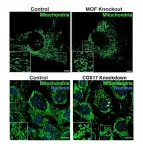Miriam Merad, M.D., Ph.D., an esteemed immunologist at the Icahn School of Medicine at Mount Sinai, has been elected to the National Academy of Medicine (NAM) in recognition of her pioneering contributions to the fields of immunology and cell biology.
Dr. Merad was elected for her transformational discoveries, establishing for the first time that tissue-resident macrophages have distinct origins, maintain their lineage separately from adult hematopoiesis, and possess unique functions that enhance tissue health, repair, infection defense, and impact tumor outcomes.
She is the Mount Sinai Professor in Cancer Immunology, Chair of the Department of Immunology and Immunotherapy, Director of the Marc and Jennifer Lipschultz Precision Immunology Institute, and Director of the Human Immune Monitoring Center at Icahn Mount Sinai.
With this appointment, Dr. Merad joins an elite group of distinguished international scientists alongside 100 new members this year. Election to the Academy is considered one of the highest honors a scientist can receive in health and medicine and recognizes individuals who have demonstrated outstanding professional achievement and commitment to service.
“This honor underscores Dr. Merad’s profound impact on these fields,” said Dennis S. Charney, M.D., Anne and Joel Ehrenkranz Dean of Icahn Mount Sinai and President for Academic Affairs of the Mount Sinai Health System. “Dr. Merad’s groundbreaking discoveries have reshaped the landscape of medical treatments, while her ongoing work continues to uncover the intricate responses of the human immune system to disease.”
In a 2010 Science study, Dr. Merad revealed that tissue-resident embryonic precursors give rise to macrophages, large white blood cells that play crucial roles in organ health and disease. This landmark research, cited thousands of times, has reshaped immunology textbooks and ignited an effort worldwide to explore tissue-resident macrophages in all areas of medicine. Dr. Merad's own team has revealed the role of the different macrophage lineages in cancer progression, treatment response, and inflammatory bowel disease in prominent journals, including Science, Cell, and Nature.
She has also made significant contributions to research on dendritic cells, a group of cells that control adaptive immunity. She identified a new subset of dendritic cells that has now become a key target to enhance viral and antitumor immunity. In a May 2020 Nature study, her team uncovered new therapeutic targets to boost dendritic cell-mediated antitumor immunity, and in a more recent paper also published in Nature this year, showed that this new therapeutic target can help treat patients with lung cancer.
Dr. Merad has transformed Mount Sinai into a global hub for studying the human immune system. She established the cutting-edge Human Immune Monitoring Center (HIMC), a world-leading research facility using single-cell technology to investigate immune cell contributions to human diseases and treatments. HIMC participates in consortia funded by the National Institutes of Health. This center is now pivotal in identifying new immune targets of cancer and inflammatory diseases.
"I am deeply humbled to be part of the National Academy of Medicine. Being elected is an incredible honor, and I’m proud to represent Mount Sinai," said Dr. Merad, who joined Mount Sinai's faculty in 2004. Raised by parents who were both scientific and medical professionals educated in France and practicing in Algeria, she was instilled with a deep respect for the transformative potential of science. She also attributes her success to Mount Sinai, which she said has provided her with the freedom to grow and pursue her research. Dr. Merad emphasizes the institution's culture of empowering junior faculty and young scientists: "If you aspire to innovate early in your career, Mount Sinai is the place to be."
The election of Dr. Merad brings Mount Sinai’s total membership in the prestigious group to 26 current and emeritus faculty members. The others are Joseph D. Buxbaum, PhD • Yvette Calderon, MD, MS • Neil S. Calman, MD • Brendan Carr, MD, MS • Dennis S. Charney, MD • Judy Cho, MD • Kenneth L. Davis, MD • Robert J. Desnick, MD, PhD • Angela Diaz, MD, MPH • Valentin Fuster, MD, PhD • Bruce Gelb, MD • Alison M. Goate, DPhil • Yasmin L. Hurd, PhD • Philip J. Landrigan, MD, MSc • Helen S. Mayberg, MD • Diane E. Meier, MD • Eric J. Nestler, MD, PhD • Maria Iandolo New, MD • Peter Palese, PhD • Ramon E. Parsons, MD, PhD • Lynne D. Richardson, MD • Hugh A. Sampson, MD • Albert Siu, MD, MSPH • Barbara G. Vickrey, MD, MPH • Rachel Yehuda, PhD.
Dr. Merad was previously elected to the National Academy of Sciences (NAS) in 2020, one of a very few Icahn Mount Sinai faculty members to hold dual Academy memberships.
New members of the Academy are elected by current members through a process that recognizes individuals who have made major contributions to the advancement of the medical sciences, health care, and public health. For more details, see this year’s official announcement from the National Academy of Medicine [https://nam.edu/news/].
-####-
About the Icahn School of Medicine at Mount Sinai
The Icahn School of Medicine at Mount Sinai is internationally renowned for its outstanding research, educational, and clinical care programs. It is the sole academic partner for the eight- member hospitals* of the Mount Sinai Health System, one of the largest academic health systems in the United States, providing care to a large and diverse patient population.
Ranked 14th nationwide in National Institutes of Health (NIH) funding and among the 99th percentile in research dollars per investigator according to the Association of American Medical Colleges, Icahn Mount Sinai has a talented, productive, and successful faculty. More than 3,000 full-time scientists, educators, and clinicians work within and across 44 academic departments and 36 multidisciplinary institutes, a structure that facilitates tremendous collaboration and synergy. Our emphasis on translational research and therapeutics is evident in such diverse areas as genomics/big data, virology, neuroscience, cardiology, geriatrics, as well as gastrointestinal and liver diseases.
Icahn Mount Sinai offers highly competitive MD, PhD, and Master’s degree programs, with current enrollment of approximately 1,300 students. It has the largest graduate medical education program in the country, with more than 2,000 clinical residents and fellows training throughout the Health System. In addition, more than 550 postdoctoral research fellows are in training within the Health System.
A culture of innovation and discovery permeates every Icahn Mount Sinai program. Mount Sinai’s technology transfer office, one of the largest in the country, partners with faculty and trainees to pursue optimal commercialization of intellectual property to ensure that Mount Sinai discoveries and innovations translate into healthcare products and services that benefit the public.
Icahn Mount Sinai’s commitment to breakthrough science and clinical care is enhanced by academic affiliations that supplement and complement the School’s programs.
Through the Mount Sinai Innovation Partners (MSIP), the Health System facilitates the real-world application and commercialization of medical breakthroughs made at Mount Sinai. Additionally, MSIP develops research partnerships with industry leaders such as Merck & Co., AstraZeneca, Novo Nordisk, and others.
The Icahn School of Medicine at Mount Sinai is located in New York City on the border between the Upper East Side and East Harlem, and classroom teaching takes place on a campus facing Central Park. Icahn Mount Sinai’s location offers many opportunities to interact with and care for diverse communities. Learning extends well beyond the borders of our physical campus, to the eight hospitals of the Mount Sinai Health System, our academic affiliates, and globally.
-------------------------------------------------------
* Mount Sinai Health System member hospitals: The Mount Sinai Hospital; Mount Sinai Beth Israel; Mount Sinai Brooklyn; Mount Sinai Morningside; Mount Sinai Queens; Mount Sinai South Nassau; Mount Sinai West; and New York Eye and Ear Infirmary of Mount Sinai.
END




